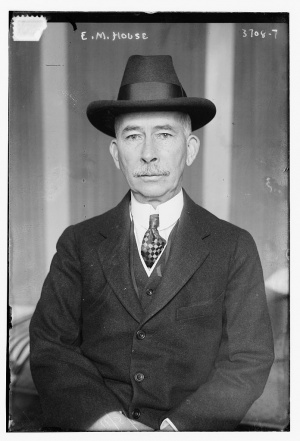Edward Mandell House
(banker, deep state operative, handler, diplomat, politician) | |
|---|---|
 | |
| Born | Edward Mandell House July 26, 1858 Houston, Texas |
| Died | March 28, 1938 (Age 79) New York City |
| Parents | • Mary Elizabeth (Shearn) House • Thomas William House |
| Children | • Mona House • Janet House • ??? |
| Spouse | Loulie Hunter |
| Member of | Alpha Delta Phi, The Money Trust |
| Party | Democrat |
Little mentioned in history books, but so much of an insider that he actually lived in the White House, Edward Mandell House was a US deep state actor and an agent of influence for The Money Trust who served as President Woodrow Wilson’s handler on behalf of the banking cartel.
He was commonly referred to as Colonel House, although he had performed no military service. Presumably this title was used to provide an appearance of legitimacy to his large influence on US government decision-making despite never holding public office and having no officially declared role in the administration, declining to be appointed to Wilson’s cabinet.
Described by Wikipedia as “a highly influential back-stage politician in Texas before becoming a key supporter of the presidential bid of Wilson in 1912”, with “a self-effacing manner”, who “did not hold office but was an "executive agent", Wilson's chief advisor on European politics and diplomacy during World War I (1914–18) and at the Paris Peace Conference of 1919.” Wilson accused House and other top advisors of deceiving him at the 1919 Paris Peace Conference, a fact that Wikipedia attributes to “a series of small strokes”.
There appears to be a broad consensus among deep political researchers studying the Wilson era that House played a major role in the passing of the Federal Reserve Act, as well as the plot by Anglo-American establishment elites to provoke and prolong World War One, both crucial developments in a larger effort to consolidate global economic control into the hands of a small number of ultra-wealthy individuals.
Activities
Advisor to Wilson
After House withdrew from Texas politics and moved to New York, he became an advisor, close friend and supporter of New Jersey governor Woodrow Wilson in 1911, and helped him win the Democratic presidential nomination in 1912. He became an intimate of Wilson and helped set up his administration.
House was offered the cabinet position of his choice (except for Secretary of State, which was already pledged to William Jennings Bryan) but declined, choosing instead "to serve wherever and whenever possible." House was even provided living quarters within the White House.
He continued as an advisor to Wilson particularly in the area of foreign affairs. House functioned as Wilson's chief negotiator in Europe during the negotiations for peace (1917–1919) and as chief deputy for Wilson at the Paris Peace Conference.
In the 1916 presidential election, House declined any public role but was Wilson's top campaign advisor: "he planned its structure; set its tone; guided its finance; chose speakers, tactics, and strategy; and, not least, handled the campaign's greatest asset and greatest potential liability: its brilliant but temperamental candidate."[1]
After Wilson's first wife died in 1914, the President was even closer to House. However, Wilson's second wife, Edith, of whom he had commissioned the Swiss-born American artist Adolfo Müller-Ury (1862–1947) to paint a portrait in 1916, disliked House, and his position weakened. It is believed that her personal animosity was significantly responsible for Wilson's eventual decision to break with House.
References
- ↑ Godfrey Hodgson (2006). Woodrow Wilson's right hand: the life of Colonel Edward M. House. Yale University Press. p. 126. ISBN 0300092695.Page Module:Citation/CS1/styles.css must have content model "Sanitized CSS" for TemplateStyles (current model is "Scribunto").
- ↑
{{URL|example.com|optional display text}}